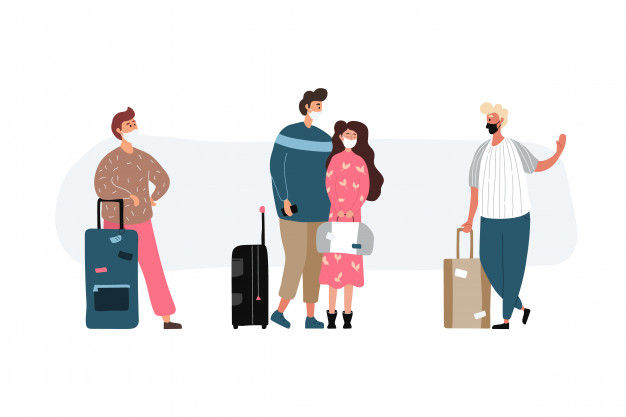Ten Ways In Which Our Travel Experience Will Change Post COVID
- Somya Tewari

- Jun 16, 2020
- 6 min read
Updated: Aug 17, 2020
I wish I could say I'm sitting amidst snow-clad peaks with a cup of chai in my hand, but the only peaks that greet my eyes are Covid tally graphs as my hands clench tighter onto the sanitiser.
Alas, I'm not the only one whose travel suitcases are now collecting dust. With the world under a virtual lockdown, borders and house doors shut, every street and corner resembles a ghost town. It's as if Thanos finally snapped.

With no vaccine in sight and no respite in the number of cases, a wave of perpetual fear has nestled into our minds.
Traveling seems like a mirage, never to be a reality again.
But hold up, don't throw out your bucket list destinations just yet. At the risk of sounding optimistic, this isn't the apocalypse.
Some countries with low infection rates have already started easing travel restrictions and making travel bubbles such as one established by Australia and New Zealand.
It is a given that the effects of the crisis will be harsh and far reaching. The question that arises is, to what extent? How will the landscape of travel and tourism change?
Here are ten ways in which our travel experience will change post COVID.
The new normal
Travelling in the post pandemic world will never be the same again. So, what does the new normal have in store for us?
1. Immigration process to become more tedious
There are high probabilities that getting permission to visit a country will become a more tedious process, requiring more documentation, more screening and health checks, more protocols and eligibility criteria to meet, etc.

Travelers from highly infected countries may find it harder to set foot in other nations.
Immunity passports might become an 'it' factor.
2. More screening, More waiting
Passengers may be required to reach railway stations and airports earlier than before, as check in may involve more rigorous and time consuming screening processes.
We may be required to self quarantine for a specific period upon landing or produce a medical clearance certificate.
This might put off many people from undertaking any trip. Countries are finding ways to tackle that. For instance, Vienna airport has started offering paid Covid-19 testing directly on site at the airport whose results shall be available within about three hours.

There may be a waiting period after rooms or flights are vacated, to sanitize the area and ensure the health security and well being of its workers and consumers. Patience shall become your greatest virtue.
3. Emphasis on hygiene and cleanliness
Admit it, now we all jump and scatter away at the sound of a simple sneeze. Suddenly, we all relate to Sheldon Cooper at a personal level.
Health and safety will be at the top of the priority list for travellers. They will move forward with increased standards of hygiene and cleanliness, looking for services that promise the same.
Masks will become an essential accessory of holiday outfits with wipes and sanitizers as our essential travel companions. Say goodbye to buffets. They are a thing of the past.

4. Strict standards and protocols
The crisis has crippled many businesses. The ones who manage to get back on their feet after the coronavirus outbreak will last only if they are dynamic, competitive, innovative and proactive in their approach.
Travel companies and businesses will be more transparent and accountable for their activities and protocols to reinforce the trust of their consumers.
It is highly likely that standardised testing and cleaning protocols will become the norm.
It seems far fetched right now but remember, before 9/11 attacks you could walk into hotels and airports without any security checks.
There will be an upgrade of standards and adherence to strict hygiene guidelines.
Major hotels and airlines are experimenting with electrostatic spraying and UV light for sanitization. For the ones who stick to manual cleaning, will have to provide proper protective gear for the safety of their workers and customers.

5. Change in trip duration
During the recovery period, i.e till the time a promising vaccine is available to the masses at large, trip durations will become shorter and closer to home.
With pay cuts and layoffs happening across the globe, the people who do dare to travel will have a light pocket. Short duration trips are cheaper and provide a safety net for travellers to go back home if something does go wrong.
However, after things recover, long duration trips may become a hit.
How does the idea of work-cation sound? There has been a revolutionary change in the way offices function. Work from home has proved to yield fruitful results and shall stick around in the future. Remote working has proven to be effective. You might be able to travel and work simultaneously.
6. Change in travel destinations
With restrictions in place, international mobility seems off limits. Thus, local, regional, and domestic travel will proliferate.
Get ready for a Zindagi Na Milegi Dobbara twist in your life. Classic road trips are likely to make a comeback as people will prefer to travel by their personal transport.

Travellers will gravitate towards destinations that are unexplored and less crowded. National parks are expected to make a rebound first.
They will also factor in how severely the country had been hit by the pandemic and the availability of medical care facilities in the area. New attractions will become popular. Paris, New York, and Rome may not be as desirable as they were earlier.
7. Surge in Artificial Intelligence
Necessity is the mother of invention.
Since social distancing is here to stay, we can expect more digitized and tech enabled services that will allow touchless or minimum contact check ins to hotels, airports etc.
Robots and automated cleaning may become a common sight.
8. Hot and sizzling deals
Sales will be a major part of the recovery. In the initial stage, until the shock of the crisis wears off, discounted fares and attractive deals will dominate the market to entice customers.
Our tight bank statements may be able to get a wind of luxurious traveling. Monisha beta might just become not-so-middle class anymore.
However, to make up for the losses and cost of operations, some sectors such as aviation may see a surge in prices eventually.

9. Flexible cancellation and refund policies
One lesson the pandemic has taught us is that nothing is certain. Within the blink of an eye, the whole world came to a standstill.
Consumers shall now pay special attention and care to the cancellation policies, and travel insurance conditions while booking or availing services for a stress free experience.
Communication channels will become more empathetic. Expect more flexible and detailed policies in your hands.
10. Sustainable and responsible tourism
Trips will become more purposeful. It won't be about quantity anymore or checking off gram worthy picture places from the list.
Travellers will seek a quality and enriching experience from whichever journey they take.
All the risk should be worth it.
Sustainability and solidarity will take a centre stage.
We have never been further apart yet united. The unprecedented pause hit by the outbreak has given us a chance to introspect and reflect upon our actions.

The lockdown has instilled a sense of gratitude and consciousness for little things that were taken for granted. Travellers will flock towards hotels that care for their customers, the environment, and the local community. Businesses will have to take up their social responsibilities ever more seriously.
This will push responsible tourism where consumers make a more valuable approach and shift towards sustainable travel and ecotourism.
A new beginning
At present, the tourism industry is truly in an existential crisis. Even if we recover from the economic fallout of the pandemic, the psychological effects will leave a lasting impact on the culture, personal and community habits, and the very way we proceed ahead with our lives.
But fret not, an end is only the beginning of something new.
This could be the dawn of a new era. There is an opportunity to start afresh.
The industry is at the cusp of change and will undergo a major transformation. This can be the push needed towards sustainable tourism, ecotourism, animal conservation, social justice, and taking responsible steps for curbing climate change to save a planet in peril.
The picture seems grim right now, but there is light at the end of the tunnel.
As the saying goes, this too shall pass.
You may also like to see the best places in India for Photographers!



Comments